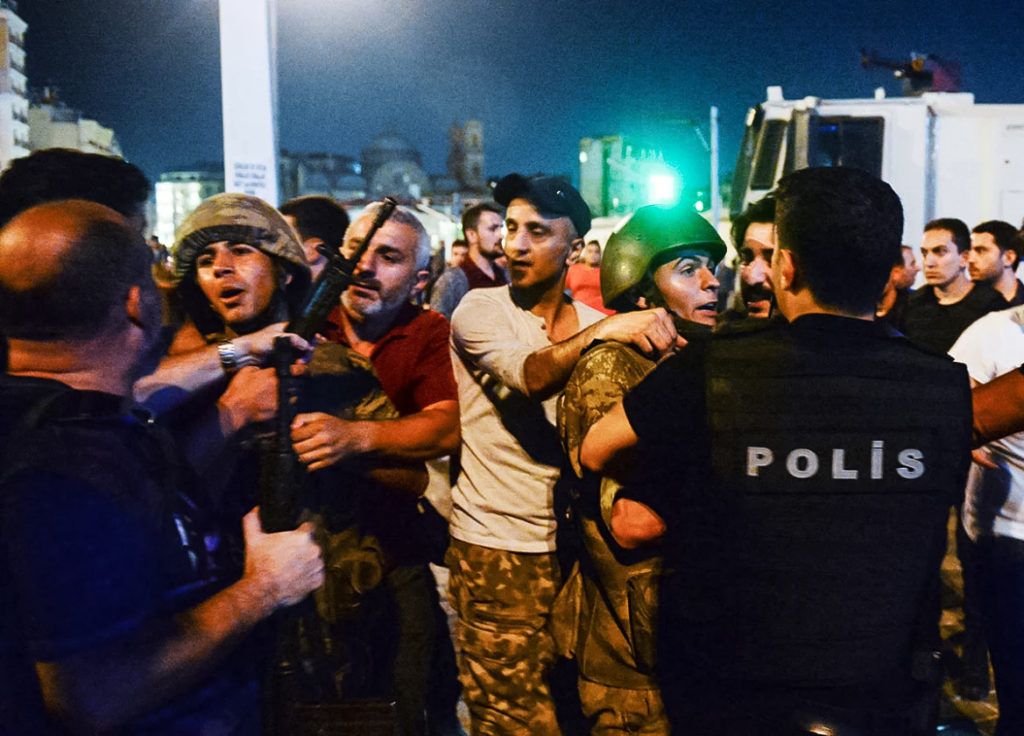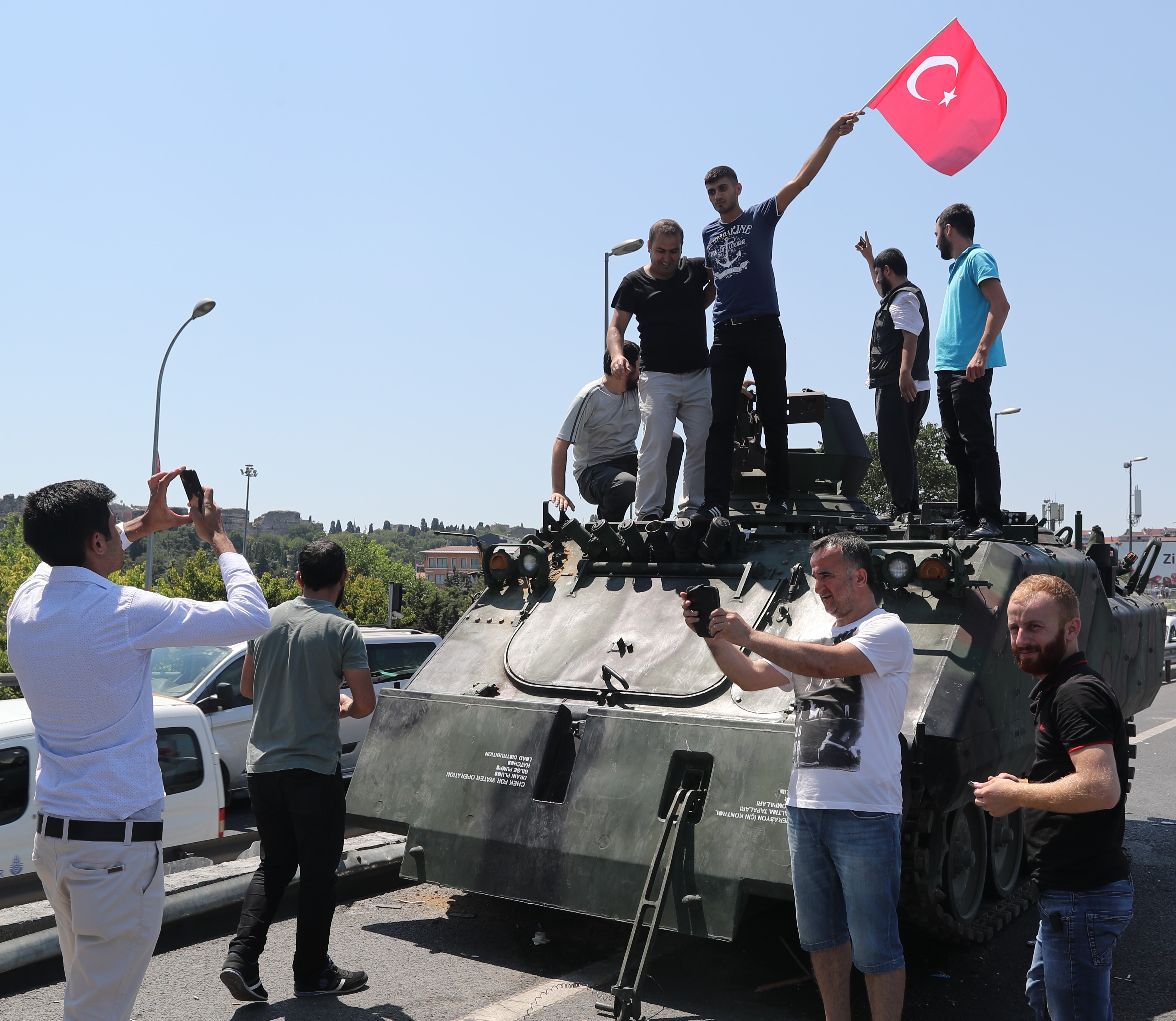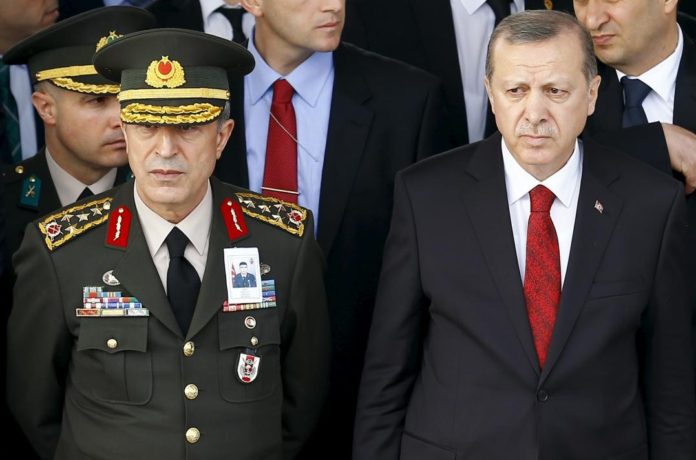Turkey and Pakistan share striking similarities when it comes to civil-military relationship. While Turkey was undergoing the botched up coup, here a little known political party “Move on Pakistan” was under focus for popping up posters, asking the military to take over, these poster were seen in all major cities of Pakistan two to three days prior to Turkish coup. Pakistan’s military immediately distanced itself from the poster raising. Turkish military’s coup making has traditionally been anchored on secular ideals of the founder of modern Turkey, Mustafa Kemal, generally known as Kemalism, under the brand name of “Republicanism”. Pakistan’s coup makers have, on the other hand, dangled between “Islamisation” to “Moderate Enlightenment”, on as required basis.
During the recent coup, Turks have proved that the bullet and barrel of the gun, even if backed by devious global powers, can’t match the power of the people. People of Pakistan have also proven their mettle, time and again, in ousting well entrenches military and quasi-military leaders. Immediate impact of collapse of Turkish coup in Pakistan was that those inviting military intervention here were dejected. They were expecting a near simultaneous re-play of Istanbul saga in Islamabad. But the events that unfolded in Istanbul changed the course of history for Turkey, and may be for Pakistan as well.
Coup failed because there were serious flaws in its implementation, key actions like taking the President into custody, cutting communications and controlling media never got implemented. Also, at the conceptual level, the political response was not correctly assessed and public support for democracy and President Erdogan was not understood. The power of social media was also ignored. The President evaded arrest by changing his known location and used the social media to ask the people to confront and defeat the coup makers knowing fully well that the centre of gravity resided in the people and not in the armed forces. Notwithstanding, with regard to Turkish government, there was a massive command, control and intelligence failure at the armed forces and state level.
Turkey’s coup was planned, though embedded with serious flaws; its expanse can be gauged from the fact that the coup makers had access to planes, tanks, ammunition vehicles and troops. The planning must have taken considerable work over a period of time, and it has been reported that ‘WhatsApp’ was used extensively by creating some sort of “Save Turkey” group. Outcome of the coup had more to do with its faulty planning and execution than the popularity, or otherwise, of the sitting government. One keynote aspect is that Turkish Military, as an institution, did not endorse the coup; and what all happened was an effort by a small portion of military to overthrow the government.
By not using the segment of the army loyal to the state against the faction that had staged the coup, President Erdogan saved the day for the institution of military by protecting it from infighting and disintegration. Instead, he relied on the people, the police and civilian agencies. So the coup that started with roaring jets and racing tanks subsided with a whimper with the military personnel publicly humiliated and castigated. Such events invariably diminish the country and its institutions therefore the effort now will be to restore the country’s image.
Turkish military is quite experienced in coup making and has fool proof Standard Operating Procedures in place. If it were the top military leadership’s decision make an institutional coup, President Erdogan would have been the first to be arrested, national communication would have been blacked out and people would have known it too late to react, and hence reconciled to fait accompli. So the first lesson is that a part take coup has remote chances of success, and when people see the political leader safe and sound and in contact with them, they are encouraged to react in favour of political leader. In case of institutional coup, little is known about the political leader’s wellbeing well until coup makers have consolidated their position, up to such time, people remain in the dark and hence are poised to desist from betting the wrong horse.
Notwithstanding, respective military and political leaderships of the various coup-prone developing countries would be drawing their conclusions and perfecting their plans related to making or countering the coup. With political leadership drawing up contingencies to mobilise masses within shortest possible time and the military leadership working out to block all holes that could lead to premature leak of coup information to masses.

An interesting question that caught attention was whether coup had American backing. Erdogan was a throe in the eyes of the US as well as the EU. Turkey has pointed fingers that the alleged master mind of the coup is residing in the US—Fethullah Gulen, a Muslim cleric living in Pennsylvania who used to be an ally of Erdogan until their falling out three years ago. However, the US has, at the highest level, denied any involvement. US Secretary of State John Kerry described public suggestions of a US role as ‘utterly false’, and said Washington had no intelligence of the coup before it began, even though the TAF base at Incirlik from where mutinous air elements flew was a Turkish-American joint user base. President Obama has expressed willingness to extradite Fethullah Gulen, provided corroborating evidence about his involvement is provided. For his part Gullen has distanced himself from the coup and expressed willingness for extradition. He has stated that: “Throughout my life, I have denounced military interventions”.
While in our part of the world it is difficult to enact a regime change through coup, or otherwise, without a wink form the US, going by the track record, Americans would not plan such a clumsy coup. They could have hired the top military man for the dirty job in exchange for legitimacy. However, at the same time, had the recent coup been a success, Americans would have wasted no time in embracing the new regime aka switch between Ferdinand Marcos and Corazon Aquino of Philippines in 1986. Now for expressing unease with Erdogan, the US and the EU are following the usual dictum, asking him to be soft in his purge. In addition to conveying concerns through official channels, Western media is also on board. New York Times commented editorially on July 20 (p.A22), under the caption “Mr. Erdogan’s Reckless Revenge”; similar content has echoed in a number of European papers as well:-
“President Recep Tayyip Erdogan has responded to the failed coup in Turkey with indiscriminate retribution. At last count, nearly 35,000 members of the military, security forces and judiciary — including 103 generals and admirals — have been detained or dismissed; 15,000 education ministry employees have been suspended; the licenses of 21,000 teachers have been revoked; and more than 1,500 university deans have been forced to resign. The purge is stunning in its breadth and depth, extending into the political and business classes as well as the government. How many of these people were actually involved in the weekend mutiny against Mr. Erdogan is unclear. Also unclear is whether Turkey’s fragile democracy can survive this challenge, whether it will become a kind of de facto authoritarian state and — of deep interest to Washington — whether it can recover sufficiently to continue on as a credible member of NATO, the alliance’s eastern anchor.
At such a time, one would hope for a leader willing and eager to unify his people under the rule of law, to reaffirm democratic values and to address the grievances that motivated the plotters in the first place. So far, Mr. Erdogan seems determined to fail this test of leadership. Since the coup attempt, he has raised the prospect of reinstating the death penalty. After many terrorist incidents, he told CNN, the Turkish people seem amenable to the idea that “terrorists should be killed.” But of course any blood bath sanctioned by the government would destabilize Turkey further and seal Mr. Erdogan’s legacy as the man who destroyed modern Turkey’s promise as a model Muslim democracy”.
Any one in President Erdogan’s shoes would focus on reconstructing the coup follow the trails and find out all those involved in the saga. Then he would take necessary safeguards to prevent recurrence. To be fair, Turkey is much better than many other modern democratic but oppressive states which are popular with Americans; for example India and Israel, their governments are not responsive to the aspirations of Kashmiris and Palestinians. Also the US police is often brutality employed against the black population of America.
One could argue that since the Syrian crisis, Erdogan did have his foreign policy related missteps, but even then he had a lot of experience in governing resulting in his country’s economic revival and infrastructure development to take credit for, before he embarked upon to provoke a once powerful military. From empowering onetime non-entities “mullah” and religious right— to trials of military officers for conspiring to over throw his government and acceptance of symbolic mass resignations of top military generals in July 2011.

It was indeed interesting to watch the excitement in Pakistan’s media regarding the army mutiny in Turkey. It almost felt as if the popular uprising by the people and rejection of the military had happened in Pakistan. An amateur politician commented that there was no comparison between Pakistan and Turkey, and that people would distribute sweets if a coup overtook Islamabad. Interestingly, even well-known anti-military analyst Ayesha Siddiqa in her OpEd piece captioned “We are no Turkey” carried by the Express Tribune on July 21 concluded that: “But then at the end of the day it is not even about good or bad lessons that societies learn. It is essentially about their togetherness and sense of ownership of the state. Honestly, this is what Pakistan lacks — a sense of ownership of self and the state due to which heinous crimes take place and boots march on. Much that I would like to disagree but I don’t think Pakistan is anywhere close to where its citizens would react the same way as the Turks. They may not distribute sweets but they will not stop the tanks, just as they have never stopped any killer”.
As soon as crumbling of coup became obvious support for the regime started flowing form the international community. The United States, Russia, NATO and the European Union appealed for stability, with US President Barack Obama calling on all parties in Turkey to back the “democratically-elected” government. Detailing a call between Obama and Secretary of State John Kerry, the White House said both agreed that “all parties in Turkey should support the democratically-elected government of Turkey, show restraint, and avoid any violence or bloodshed.”
UN chief Ban Ki-moon meanwhile lashed out against the attempted coup, as he called for civilian rule to be maintained. “Military interference in the affairs of any state is unacceptable,” Ban said in a statement. EU chiefs Donald Tusk and Jean-Claude Juncker backed Erdogan’s government and urged a “swift return” to normal. Kremlin spokesman Dmitry Peskov told reporters that Moscow was “deeply concerned” about the situation, with President Vladimir Putin being kept up to date by the foreign ministry and intelligence services. NATO chief Jens Stoltenberg called for “calm and restraint, and full respect for Turkey’s democratic institutions and its constitution,” adding that the country was “a valued NATO ally”.
Democratic presidential candidate Hillary Clinton urged “calm and respect for laws, institutions, and basic human rights and freedoms” in the country. The French Foreign Ministry meanwhile called for “the avoidance of violence and respect for democratic order,” in an appeal echoed by German Chancellor Angela Merkel. Iranian Foreign Minister Mohammad Javad Zarif also said: “Stability, democracy and the security of the Turks are the priority.” Greek Prime Minister Alexis Tsipras also expressed his “support for the democratically elected” government. Prime Minster of Pakistan praised the people and President of Turkey: “We deeply admire the resolve of the brave and resilient Turkish people, who stood up against the forces of darkness and anarchy to express their support and commitment to democracy… “We express our complete support and solidarity with President Erdogan, the democratically elected government of Turkey, and the democratic institutions of Turkey.”
On July 22, Turkish Ambassador to Pakistan Sadik Babur Girgin thanked the government and people of Pakistan for their support to democratic government. He stated that situation in Turkey after the coup attempt by a small military group belonging to Fethullah Gülen Terrorist Organization (FETÖ) against the constitutional government of President Recep Tayyip Erdogan was back to normal. The Ambassador, who had returned from Turkey a night before briefed media persons in the embassy on the ground reality which he had witnessed during his stay in Turkey.
Dispelling the impression created by western media reports about Gulenist coup attempt. He stated that less than one per cent of military men, about four helicopter gunships, same number of F-16s and some tanks were involved in attacks on Parliament building, civilians on the Istanbul Bridge, Presidential Compound and Istanbul airport on July 15. Parliament was in session when it was attacked 10 to 11 times.
He informed that an estimated two hundred civilians were martyred while 1400 were wounded in the attacks. “It was not act of armed forces and its command but a small section came on the streets that were foiled by the people while risking their lives,” he said. State television was captured by the rebels. Turkish media largely opposed armed attempt to down democratically elected government. All political parties within and outside parliament stood against this adventurism, the envoy said and added so far, 7,423 plotters have been detained and fair trial is underway against them.
He added that, some elements who had links with Fethullah Gulen group in educational institutions, judiciary and bureaucracy have been suspended to be tried under the law. The coup lasted only for four to five hours. Attempts were made against President Tayyip Erdogan who was in Marmaris town at that time but after a while he was in Istanbul with the people. He expressed his disappointment on the coverage made by western media about the coup attempt. The Ambassador also complained about the initial reaction from some of the countries which were claiming to be democratic nations. To a question on clamping of emergency in Turkey he said it was passed by the Turkish Parliament to deal with emergency situation. Every act of the government will be under the law of the land which will be approved by the Parliament. Similarly, he said the issue of re-introduction of death sentence will also go through the process of Parliament.
Babur Girgin stated that Turkey is a democratic country which has been facing terrorism by terror organizations including PKK and Daesh. Unfortunately, some western countries have double standards to deal with such organizations including Gulen Terror Organisation. Turkey also expects action from the US government against cleric Fathullah Gulen holed up in the US.
In Turkey, the question that will long be debated whether the coup was driven by a clash of ideologies or whether it was a response to perceived governance failures—probably both. Coup saga in Turkey reminded one of failed coup in erstwhile USSR during Gorbachev’s regime in August 1991. Numerous coups and counter coups propped up by the people and or militaries during and after the so called “Arab Spring” failed to bring prosperity and stability. Likewise, America’s spree of forced regime changes in the Middle East and North Africa (MENA) region has only brought chaos to the region—the chaos in now uncontrollable even by the creators.




